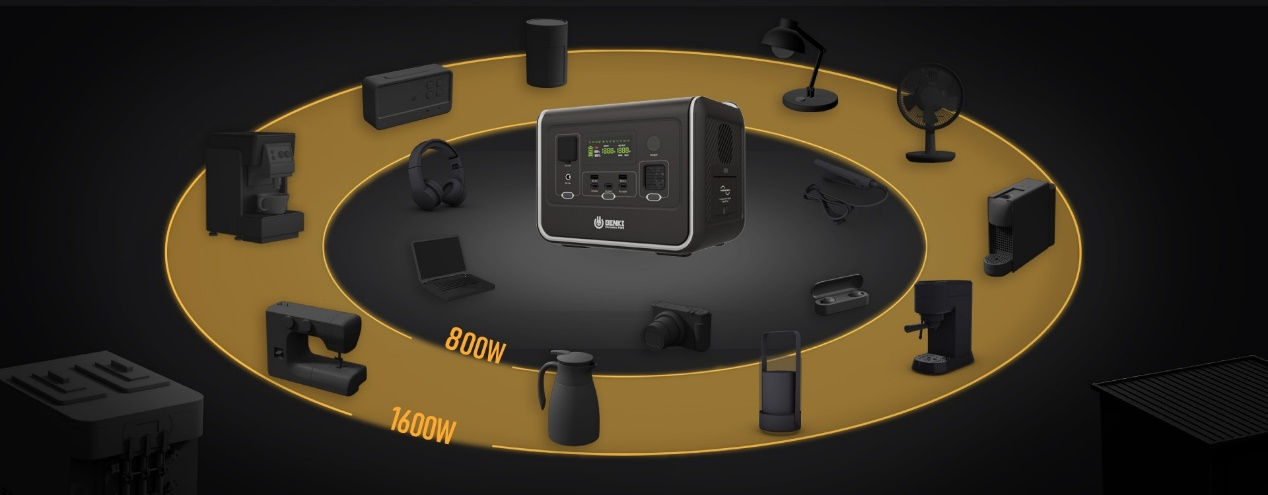Introduction
In an era marked by increasing concern for the environment and a growing demand for reliable power sources, the choice between solar generators and traditional diesel generators has become a pivotal decision for many. This article aims to explore the stark differences between these two options, highlighting the advantages of solar generators while shedding light on the hazards associated with diesel generators. We will also present data from authoritative institutions to support our findings.

Genki GK800 solar generator
I. The Difference Between Solar Generators and Diesel Generators
1.Source of Energy: Solar Generators: Solar generators harness energy from the sun using photovoltaic panels. This energy is renewable, clean, and inexhaustible as long as the sun shines. Diesel Generators: Diesel generators, on the other hand, rely on fossil fuels, specifically diesel, to produce electricity. This is a non-renewable and polluting energy source.
2.Environmental Impact: Solar Generators: Solar generators produce no greenhouse gas emissions during operation, making them environmentally friendly and contributing to a reduction in carbon footprints. Diesel Generators: Diesel generators emit harmful pollutants such as nitrogen oxides, sulfur dioxide, and particulate matter, contributing to air pollution and adverse health effects.
3.Noise Pollution: Solar Generators: Solar generators are virtually silent, creating no noise pollution during operation. Diesel Generators: Diesel generators are notorious for their loud and disruptive noise levels, causing disturbances in residential and commercial areas.
II. Advantages of Solar Generators
1.Renewable Energy Source: Solar generators derive their power from the sun, an energy source that will remain available for billions of years, ensuring a consistent supply of electricity.
2.Low Operating Costs: Once installed, solar generators have minimal operating costs as they rely on free sunlight. This can lead to substantial long-term savings.
3.Environmentally Friendly: Solar generators do not produce harmful emissions, contributing to a reduction in air pollution and a cleaner planet.
4.Low Maintenance: Solar generators have fewer moving parts compared to diesel generators, translating to lower maintenance requirements and costs.

III. Hazards of Diesel Generators
1.Air Pollution: Diesel generators release pollutants into the atmosphere, leading to respiratory problems and contributing to global air quality issues.
2.Dependence on Fossil Fuels: Diesel generators rely on a finite resource, making them susceptible to fuel price fluctuations and supply chain disruptions.
3.Noise Disturbances: The noise generated by diesel generators can be a nuisance in residential areas, affecting the quality of life for nearby residents.
IV. Data Reports from Authoritative Institutions
1.According to a report by the International Energy Agency (IEA), solar power accounted for nearly 3% of the world's electricity generation in 2020, with the potential to significantly increase its share in the coming years.
2.The World Health Organization (WHO) estimates that outdoor air pollution from sources like diesel generators is responsible for 4.2 million premature deaths each year.
3.A study conducted by the U.S. Environmental Protection Agency (EPA) found that diesel generators emit significant amounts of nitrogen oxides, a major contributor to smog and respiratory problems.
Conclusion
In the battle between solar generators and traditional diesel generators, the former emerges as the cleaner, more sustainable, and environmentally responsible choice. Solar generators offer numerous advantages, including renewable energy, low operating costs, and minimal environmental impact, while diesel generators pose hazards related to air pollution, fuel dependency, and noise disturbances. As the world seeks greener energy solutions, the transition to solar generators becomes not only logical but imperative for a cleaner and more sustainable future.
Post time: Oct-17-2023
